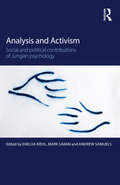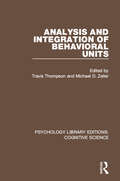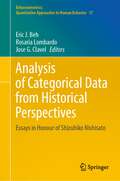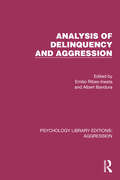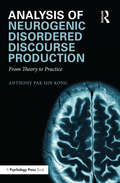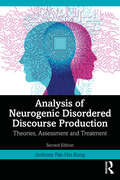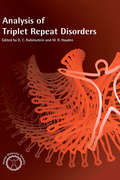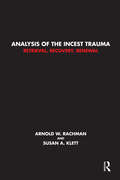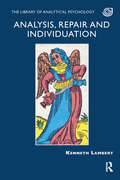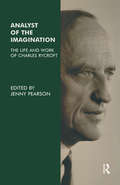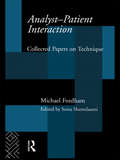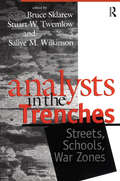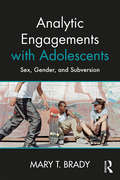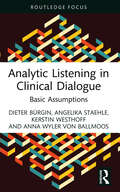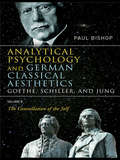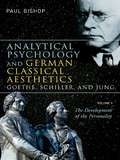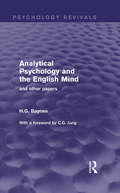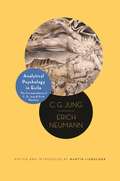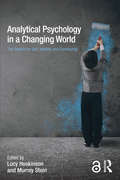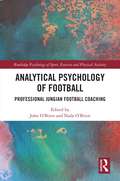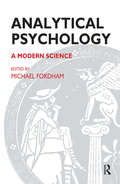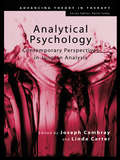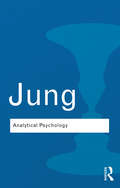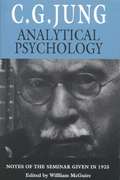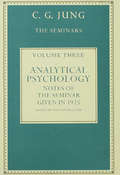- Table View
- List View
Analysis and Activism: Social and Political Contributions of Jungian Psychology
by Andrew Samuels Emilija Kiehl Mark SabanJungian psychology has taken a noticeable political turn in the recent years, and analysts and academics whose work draws on Jung’s ideas have made internationally recognised contributions in many humanitarian, communal and political contexts. This book brings together a multidisciplinary and international selection of contributors, all of whom have track records as activists, to discuss some of the most compelling issues in contemporary politics. Analysis and Activism is presented in six parts: Section One, Interventions, includes discussion of what working outside the consulting room means, and descriptions of work with displaced children in Colombia, projects for migrants in Italy and of an analyst’s engagement in the struggles of indigenous Australians. Section Two, Equalities and Inequalities, tackles topics ranging from the collapse of care systems in the UK to working with victims of torture. Section Three, Politics and Modernity, looks at the struggles of native people in Guatemala and Canada and oral history interviews with members of the Chinese/Vietnamese diaspora. Section Four, Culture and Identity, studies issues of race and class in Brazil, feminism and the gendered imagination, and the introduction of Obamacare in the USA. Section Five, Cultural Phantoms, examines the continuing trauma of the Cultural Revolution in China, Jung’s relationship with Jews and Judaism, and German-Jewish dynamics. Finally, Section Six, Nature: Truth and Reconciliation, looks at our broken connection to nature, town and country planning, and relief work after the 2011 earthquake in Japan. There remains throughout the book an acknowledgement that the project of thinking forward the political in Jungian psychology can be problematic, given Jung’s own questionable political history. What emerges is a radical and progressive Jungian approach to politics informed by the spirit of the times as well as by the spirit of the depths. This cutting-edge collection will be essential reading for Jungian and post-Jungian academics and analysts, psychotherapists, counsellors and psychologists, and academics and students of politics, sociology, psychosocial studies and cultural studies.
Analysis and Integration of Behavioral Units (Psychology Library Editions: Cognitive Science #25)
by TRAVIS THOMPSON AND MICHAEL D. ZEILEROriginally published in 1986, this volume was the result of a conference in honor of the 65th birthday of the late Kenneth MacCorquodale, an exceptionally eloquent spokesman for the field of experimental analysis of behaviour at the time. The present volume grew directly out of the issues raised by MacCorquodale and Meehl in their "Excursis: The Response Concept" paper and which MacCorquodale posed so often when he taught. It is a fitting tribute to the man on his 65th birthday that a group of scholars whom he held in the highest regard convened in one place to think out loud about two of the thorniest problems facing behavioral science, namely, the nature of the units of analysis of the subject matter and the mechanisms responsible for their integration.
Analysis of Categorical Data from Historical Perspectives: Essays in Honour of Shizuhiko Nishisato (Behaviormetrics: Quantitative Approaches to Human Behavior #17)
by Eric J. Beh Rosaria Lombardo Jose G. ClavelThis collection of essays is in honor of Shizuhiko Nishisato on his 88th birthday and consists of invited contributions only. The book contains essays on the analysis of categorical data, which includes quantification theory, cluster analysis, and other areas of multidimensional data analysis, covering more than half a century of research by the 41 interdisciplinary and international researchers who are contributors. Thus, it offers the wisdom and experience of work past and present and attracts a new generation of researchers to this field. Central to this wisdom and experience is that of Prof. Nishisato, who has spent much of the past 60 years mentoring and providing leadership in the research of quantification theory, especially that of “dual scaling”. The book includes contributions by leading researchers who have worked alongside Prof. Nishisato, published with him, been mentored by him, or whose work has been influenced by the research he has undertaken over his illustrious career. This book inspires researchers young and old as it highlights the significant contributions, past and present, that Prof. Nishisato has made in his field.
Analysis of Delinquency and Aggression (Psychology Library Editions: Aggression)
by Albert Bandura Emilio Ribes-InestaOriginally published in 1976, this volume is organized about two central themes: the experimental analysis of aggression, and the application of learning principles to the prevention and modification of delinquency. The chapters, all new and original at the time, demonstrate how the problems of aggression, which had been interpreted in diverse ways, can be analyzed under controlled laboratory conditions. In addition, the contributors offer an explanation of how behavior modification techniques, derived from this knowledge, can be used for preventive purposes.Because of the social nature of aggression and delinquency, behavior change techniques were principally aimed at modifying environmental influences. The contributions to this volume illustrate how behavioral scientists may aid in the understanding and amelioration of conditions that give rise to violence. Today it can be read and enjoyed in its historical context.
Analysis of Neurogenic Disordered Discourse Production: From Theory to Practice
by Anthony Pak KongAnalysis of Neurogenic Disordered Discourse Production provides a comprehensive review and discussion of aphasia and its related disorders, their corresponding clinical discourse symptoms that speech-language pathologists and related healthcare professionals should address, and the different methods of discourse elicitation that are research- and clinically-oriented. Contemporary issues related to disordered/clinical discourse production are covered, and discussions of various treatment options in relation to discourse symptoms are included. Finally, the manifestation of discourse symptoms as a function of speakers’ bilingual/multilingual status and specific considerations related to clinical assessment and intervention are explored. Readers who want to learn the background and techniques of discourse analysis, refresh their knowledge of discourse production, update their knowledge of assessment and treatment of discourse production, and learn about contemporary issues of discourse annotation and analysis using existing computer software will find this book a valuable tool. With its comprehensive coverage, it offers a thorough understanding of the nature, assessment, and remediation of discourse deficits in aphasia and related disorders. Readers will also benefit from examples throughout the book that connect theory to real-life contexts of discourse production.
Analysis of Neurogenic Disordered Discourse Production: Theories, Assessment and Treatment
by Anthony Pak-Hin KongAnalysis of discourse production among speakers with acquired communication disorders is an important and necessary clinical procedure. This book provides a comprehensive review and discussion of aphasia and its related disorders, their corresponding clinical discourse symptoms that speech-and-language pathologists should address, and the different methods of discourse elicitation that are clinically and research oriented. This edition has been thoroughly updated throughout to include the latest research, including advances in word retrieval and discourse production, cognitive and multicultural aspects of disordered discourse production, application of technology to understand and evaluate spoken discourse, and evidence-based intervention of discourse impairments. Contemporary issues related to disordered/clinical discourse elicitation are added. Recent advancement in discourse analysis is covered and discussions of various treatment options of discourse symptoms are provided. Finally, the manifestation of discourse symptoms as a function of speakers’ multilingual/multi-cultural status and specific considerations related to clinical assessment and remediation are explored. As the only introductory text to include comprehensive coverage of basic knowledge of neurogenic disordered discourse, it is a must-read for students, clinicians, and researchers in various fields. Readers will also benefit from plenty of examples that provide a connection between the theoretical contents presented in the text and application to real-life contexts of discourse production.
Analysis of Triplet Repeat Disorders (Human Molecular Genetics Ser.)
by D. C. Rubinsztein M. R. HaydenAnalysis of Triplet Repeat Disorders is aimed at clinicians and scientists who work with these diseases or who have an interest in the field. Using the clinical picture of these diseases as a starting point, the book reviews and integrates the current understanding of their molecular pathologies, the genotype-phenotype relationships, the mutational processes of trinucleotide repeats, and the laboratory and clinical issues relating to genetic testing for these disorders.
Analysis of the Incest Trauma: Retrieval, Recovery, Renewal
by Susan A. KlettChildhood sexual abuse within the family of origin and society's institutions, such as the church, education, sports, and the world of celebrity, has been neglected as a significant issue by psychoanalysis and society. The incest trauma needs to be understood as one of the most significant problems of contemporary society. This book is an attempt to re-establish incest trauma as a significant psychological disorder by tracing the evolutionary trajectory of psychoanalysis from the Seduction Theory to the Oedipal Therapy to the Confusion of Tongues Theory. By examining the theoretical, emotional, interpersonal, and political issues involved in Freud's abandoning the Seduction Hypothesis and replacing it with the Oedipal Complex, we can see how system building became more important than the emotional welfare of children. In a series of chapters the authors demonstrate this neglect of the incest trauma.
Analysis, Repair and Individuation (The\library Of Analytical Psychology Ser.)
by Kenneth LambertAn exposition on individuation including 'Archetypes, Individuation and Internal Objects' and 'The Individuation Process'
Analyst of the Imagination: The Life and Work of Charles Rycroft
by Jenny PearsonCharles Rycroft's lucid jargon-free approach to psychoanalysis inspired a whole generation. Taking inspiration from many fields outside psychoanalysis, including history, literature, linguistics and ethology, he established the important link between mental health and the imagination, creating a broader perspective and encouraging free thinking. This solitary and creative "rebel" rarely received the recognition he deserved, but this collection of articles and papers by people who felt the benefit of his ever-curious, expanding wealth of knowledge, goes some way to acknowledging the debt owed to him, and introducing a new generation to this innovative analyst.
Analyst-Patient Interaction: Collected Papers on Technique
by Michael FordhamMichael Fordham was a friend of Jung, made many major contributions to analytical psychology. This volume brings together his key writings on analytical technique. They are important because they have shaped and informed analytical technique as we find it today. These writings will be welcomed by both trainee and practising analysts.
Analysts in the Trenches: Streets, Schools, War Zones
by Bruce Sklarew Stuart W. Twemlow Sallye M. WilkinsonThe horrific events of 9/11 and its sequelae have reinforced what thoughtful analysts have long known: that they have a responsibilty to respond to the complex social and emotional issues arising in their communities - to function, that is, as "community psychoanalysts." Analysts in the Trenches vividly illustrates what socially engaged analysts can offer to violent and disturbed communities. Contributors bring analytic expertise to bear on the emotional sequelae to violence, including sexual and physical abuse; to multiple and traumatic losses; and to learning inhibitions. Thay also explore and devise community responses to the scapegoating of classes and groups, to homelessness, and to variations in family structures. This volume provides heartening testimony to the relevance of psychodynamic thinking in the post-9/11 world and will spur professional readers to develop their own programs of community involvement.
Analytic Engagements with Adolescents: Sex, Gender, and Subversion
by Mary T. BradyIn Analytic Engagements with Adolescents, Mary T. Brady takes on the intensity and 'heat' of adolescent psychoanalytic treatment.She is a guide in the distinctive challenges of work with adolescents. The intensity of this work manifests in various ways; the heightened importance of body issues and related transference and countertransference, the subversiveness of risk-taking behavior and the rejection and rebellion against authority, and the effects of parental response and family dynamics. Adolescence is a period when 'things happen': first wet dreams, first menstruation, first romance. Nascent sexuality comes directly into the field as the adolescent is confronted with new bodily experiences. Subversiveness is integral to the adolescent’s development; parents (and analysts) are overthrown as the adolescent questions the status quo and experiments with new capacities and desires. Drawn into the adolescent’s turbulence, Bion’s concept of 'thinking under fire' is shown to be vital to the analyst’s engagement. Bion’s group theory here informs Brady’s immediate experience of the interaction of individual and family dynamics. The voices of Brady’s adolescent patients and her dynamic involvement with them will help the clinician to be open to the 'hot' moments of their analytic work. Drawing on Bion’s thinking and her own extensive experience with adolescents, Brady offers an essential guide to the difficulties and challenges encountered when working with this patient group. She provides practical suggestions for psychoanalysts and psychoanalytic psychotherapists working in this area.
Analytic Listening in Clinical Dialogue: Basic Assumptions (Routledge Focus on Mental Health)
by Dieter Bürgin Angelika Staehle Kerstin Westhoff Anna Wyler von BallmoosAnalytic Listening in Clinical Dialogue focuses on the work of four leading clinicians as they assess how their unconscious basic assumptions impact their clinical work. Using the case study of a seven-year-old boy, the authors evaluate a videotaped psychoanalytic first interview and exchange their mutual clinical approaches. Their discussions uncover the way that unconscious basic assumptions arise from the core of one’s personality and act as the pillars that support primary- and secondary-process thinking. These fundamental models of thought and emotion result in convictions which play a key role in the processes of understanding, evaluating, classifying, anticipating and regulating. The authors show how an ‘analytic listening’ approach can also be used to good effect in supervisions and intervisions, as it provides a path out of the domain of ‘being right’ into a space of what is shared as well as what is different. They argue that this method allows an analyst’s own blind spots to be reduced. Translated from the original German, Analytic Listening in Clinical Dialogue will be of great interest to psychoanalysts, psychotherapists and psychologists.
Analytical Psychology and German Classical Aesthetics: The Constellation of the Self
by Paul BishopThe second volume of Analytical Psychology and German Classical Aesthetics builds on the previous volume to show how German classicism, specifically the classical aesthetics associated with Goethe and Schiller known as Weimar classicism, was a major influence on psychoanalysis and analytical psychology alike. This volume examines such significant parallels between analytical psychology and Weimar classicism as the methodological similarities between Goethe’s morphological and Jung’s archetypal approaches, which both seek to use synthesis as well as analysis in their attempt to understand the world. It also focuses on the project of the construction of the self, which, it is argued, is not only a personal but also a cultural activity. This book, like its previous volume, aims to clarify the intellectual continuity between Weimar classicism and analytical psychology. It will be of interest to both students and scholars in the fields of analytical psychology, comparative literature, and the history of ideas.
Analytical Psychology and German Classical Aesthetics: The Development of the Personality
by Paul BishopIn this volume, Paul Bishop investigates the extent to which analytical psychology draws on concepts found in German classical aesthetics. It aims to place analytical psychology in the German-speaking tradition of Goethe and Schiller, with which Jung was well acquainted. Analytical Psychology and German Classical Aesthetics argues that analytical psychology appropriates many of its central notions from German classical aesthetics, and that, when seen in its intellectual historical context, the true originality of analytical psychology lies in its reformulation of key tenets of German classicism. Although the importance for Jung of German thought in general, and of Goethe and Schiller in particular, has frequently been acknowledged, until now it has never been examined in any detailed or systematic way. Through an analysis of Jung’s reception of Goethe and Schiller, Analytical Psychology and German Classical Aesthetics demonstrates the intellectual continuity within analytical psychology and the filiation of ideas from German classical aesthetics to Jungian thought. In this way it suggests that a rereading of analytical psychology in the light of German classical aesthetics offers an intellectually coherent understanding of analytical psychology. By uncovering the philosophical sources of analytical psychology, this first volume returns Jung’s thought to its core intellectual tradition, in the light of which analytical psychology gains new critical impact and fresh relevance for modern thought. Written in a scholarly yet accessible style, this book will interest students and scholars alike in the areas of analytical psychology, comparative literature, and the history of ideas.
Analytical Psychology and the English Mind: And Other Papers (Psychology Revivals)
by H.G. BaynesOriginally published in 1950, the name of the late Dr H.G. Baynes was already well-known as a leading exponent of and translator of the writings of Professor C.G. Jung, as author and as psychotherapist. The essay which gives it title to this varied and interesting collection of writings, shows clearly Dr Baynes’s gift for illuminating a familiar subject with fresh insight drawn from his wide knowledge of the unconscious mind. He can make the unconscious real to us, and can convince us that myth and dream are expressions of vital problems of the human soul. The collection includes material to interest many types of reader, from The British Journal of Medical Psychology, from Folk-Lore, from The Society for Psychical Research. But perhaps most full of interest for the majority of readers are the first three chapters of an unfinished book – What It Is All About; here we find an admirable introduction, given with a wealth of illustration, to the main concepts of Professor Jung’s analytical psychology. Dr Baynes made Professor Jung’s thought his own, without loss of his own originality. He can touch with significance any subject on which he writes, whether it be the problem of the individual or the kindred problems of humanity.
Analytical Psychology in Exile: The Correspondence of C. G. Jung and Erich Neumann (Philemon Foundation Series)
by Erich Neumann C. G. JungTwo giants of twentieth-century psychology in dialogueC. G. Jung and Erich Neumann first met in 1933, at a seminar Jung was conducting in Berlin. Jung was fifty-seven years old and internationally acclaimed for his own brand of psychotherapy. Neumann, twenty-eight, had just finished his studies in medicine. The two men struck up a correspondence that would continue until Neumann's death in 1960. A lifelong Zionist, Neumann fled Nazi Germany with his family and settled in Palestine in 1934, where he would become the founding father of analytical psychology in the future state of Israel.Presented here in English for the first time are letters that provide a rare look at the development of Jung&’s psychological theories from the 1930s onward as well as the emerging self-confidence of another towering twentieth-century intellectual who was often described as Jung&’s most talented student. Neumann was one of the few correspondence partners of Jung&’s who was able to challenge him intellectually and personally. These letters shed light on not only Jung&’s political attitude toward Nazi Germany, his alleged anti-Semitism, and his psychological theory of fascism, but also his understanding of Jewish psychology and mysticism. They affirm Neumann&’s importance as a leading psychologist of his time and paint a fascinating picture of the psychological impact of immigration on the German Jewish intellectuals who settled in Palestine and helped to create the state of Israel.Featuring Martin Liebscher&’s authoritative introduction and annotations, this volume documents one of the most important intellectual relationships in the history of analytical psychology.
Analytical Psychology in a Changing World: The Search For Self, Identity And Community
by Murray Stein Lucy HuskinsonHow can we make sense of ourselves within a world of change? In Analytical Psychology in a Changing World, an international range of contributors examine some of the common pitfalls, challenges and rewards that we encounter in our efforts to carve out identities of a personal or collective nature, and question the extent to which analytical psychology as a school of thought and therapeutic approach must also adapt to meet our changing needs. The contributors assess contemporary concerns about our sense of who we are and where we are going, some in light of recent social and natural disasters and changes to our social climates, others by revisiting existential concerns and philosophical responses to our human situation in order to assess their validity for today. How we use our urban environments and its structures to make sense of our pathologies and shortcomings; the relevance of images and the dynamic forms that underpin our experience of the world; how analytical psychology can effectively manage issues and problems of cultural, religious and existential identity – these broad themes, and others besides, are vividly illustrated by striking case-studies and unique personal insights that give real lucidity to the ideas and arguments presented. Analytical Psychology in a Changing World will be essential reading for Jungian and post-Jungian scholars and clinicians of depth psychology, as well as sociologists, philosophers and any reader with a critical interest in the important cultural ideas of our time.
Analytical Psychology of Football: Professional Jungian Football Coaching (Routledge Psychology of Sport, Exercise and Physical Activity)
by Nada O’Brien John O’BrienJungian psychology of football is a new and cutting edge approach being applied by Champions league teams and used in youth football training. Implications for the wider role of football organisations in society as models for the diagnosis and management of trauma and tension in our changing world are highlighted. Analytical Psycholog y of Football: Professional Jungian Football Coaching provides for youth trainers, accessible, scientifically based tools and techniques to develop resilience and sustain motivation in grass roots and elite footballers. The values and psychological make-up of best in class international trainers are revealed, and commented upon by a Champions League manager. Theory is traced from the early history of the game through to the present day, equipping trainers with the guiding psychological concepts which are shaping the future of the sport. Case examples of how the game can support society through periods of change, and in fact, advance civilisation are described. A Jungian appreciation of the transformational power of the football is a step forward for psychologists, and educators who wish to keep up with advancements in their professions, for football students and for trainers wishing to remain competitive.
Analytical Psychology: A Modern Science (The\library Of Analytical Psychology Ser.)
by Michael FordhamThis is a book of two parts: the first focuses on theoretical concepts with special reference to the structure of the psyche, while the second includes more clinical material. Both exemplify the London Society's interest in childhood and the development of ideas about the use of reductive analysis within the Jungian framework.
Analytical Psychology: Contemporary Perspectives in Jungian Analysis (Advancing Theory in Therapy)
by Joseph Cambray Linda CarterThe Jungian approach to analysis and psychotherapy has been undergoing an extensive reconsideration during the past decade. Analytical Psychology calls special attention to the areas that have been most impacted: the core concepts and practices of the Jungian tradition, along with relevant intellectual and historical background.Internationally renowned authors drawing on the forefront of advance in neuroscience, evolution, psychoanalysis, and philosophical and historical studies, provide an overview of the most important aspects of these developments. Beginning with a chronicle of the history of the Jungian movement, areas covered include:* a background to the notion of 'archetype'* human development from a Jungian perspective* the creative extension of Jung's theory of psychological types* re-evaluation of traditional Jungian methods of treatment in the light of contemporary scientific findings* Jungian development of transference and countertransference* a new formulation of synchronicity. Analytical Psychology presents a unique opportunity to witness a school of psychotherapy going through a renaissance. Drawing on original insights from its founder, C.G. Jung, this book helps focus and shape the current state of analytical psychology and point to areas for future exploration.
Analytical Psychology: Its Theory and Practice (Routledge Classics)
by Carl Gustav JungIn 1935 Jung gave a now famous and controversial course of five lectures at the Tavistock Clinic in London. In them he presents, in lucid and compelling fashion, his theory of the mind and the methods he had used to arrive at his conclusions: dream analysis, word association and ‘active imagination.’ Immediately accessible to the general reader, the Tavistock lectures are a superb introduction to anyone coming to Jung’s psychology for the first time and crucial for understanding analytical psychology. A fascinating feature of the book is the inclusion of some of the questions posed to Jung at the end of each lecture. These questions, including those from leading psychoanalysts such as Wilfrid Bion, and the discussions that follow offer an outstanding example of a great thinker at the peak of their powers. Also amongst the audience was Samuel Beckett, who was deeply affected by what Jung had to say.With a new foreword by Kevin Lu
Analytical Psychology: Notes of the Seminar Given in 1925 (Jung Seminars #601)
by C. G. JungFor C. G. Jung, 1925 was a watershed year. He turned fifty, visited the Pueblo Indians of New Mexico and the tribesmen of East Africa, published his first book on the principles of analytical psychology meant for the lay public, and gave the first of his formal seminars in English. The seminar, conducted in weekly meetings during the spring and summer, began with a notably personal account of the development of his thinking from 1896 up to his break with Freud in 1912. It moved on to discussions of the basic tenets of analytical psychology--the collective unconscious, typology, the archetypes, and the anima/animus theory. In the elucidation of that theory, Jung analyzed in detail the symbolism in Rider Haggard's She and other novels. Besides these literary paradigms, he made use of case material, examples in the fine arts, and diagrams.
Analytical Psychology: Notes of the Seminar given in 1925 by C.G. Jung (Bollingen Ser. #No. Xcix: 3)
by William McGUIREBased on the Tavistock Lectures of 1930, one of Jung's most accessible introductions to his work.
